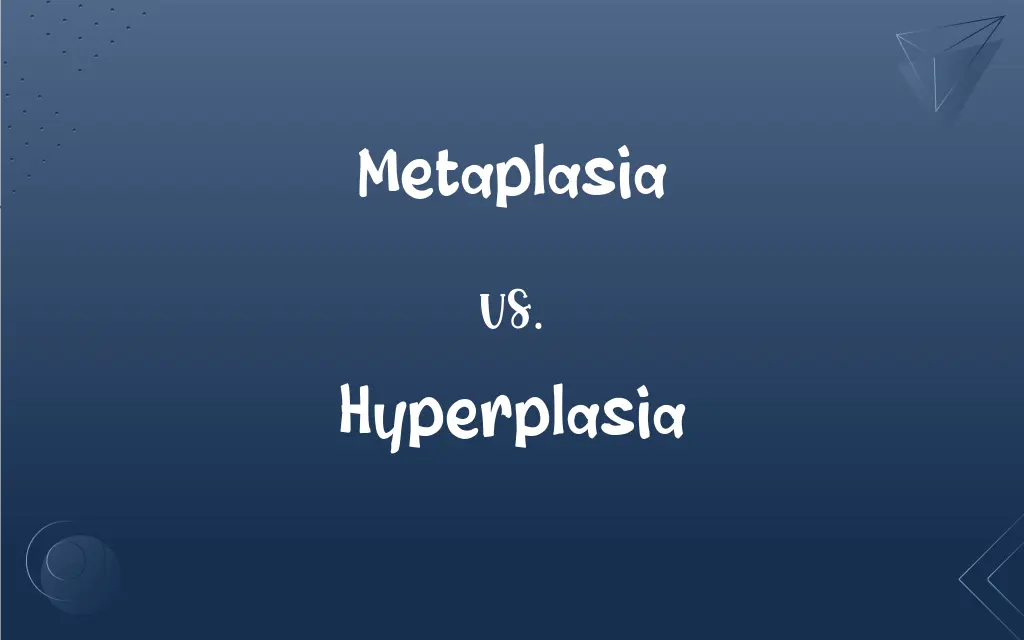Metaplasia vs. Hyperplasia: What's the Difference?
By Aimie Carlson || Updated on May 22, 2024
Metaplasia is the reversible change of one cell type to another due to environmental stress, while hyperplasia is the increase in the number of cells in an organ or tissue due to cell proliferation.

Key Differences
Metaplasia occurs when one type of cell transforms into another type, often as an adaptive response to chronic irritation or inflammation. This process is usually reversible if the stressor is removed, as cells adapt to new environmental conditions by changing their structure and function. Hyperplasia, on the other hand, involves an increase in the number of cells within a tissue or organ, leading to its enlargement. This proliferation can be a normal response to a stimulus, such as hormonal changes or wound healing, but can also be pathological, such as in the case of cancer.
Metaplasia often indicates a response to chronic injury or stress and is associated with a change in cell type, while hyperplasia indicates increased cell production and tissue growth. Both processes can be reversible, but hyperplasia, particularly when uncontrolled, can sometimes lead to tumorigenesis, unlike metaplasia which does not inherently involve cell proliferation.
Metaplasia involves a switch in the differentiation pathway of stem cells leading to a different cell type, whereas hyperplasia results from increased cellular proliferation of the same cell type. The distinction is crucial for understanding different pathological processes and potential treatment strategies in clinical practice.
Comparison Chart
Definition
Reversible change of one cell type to another
Increase in the number of cells in a tissue
Trigger
Chronic irritation or environmental stress
Hormonal changes, wound healing, or pathology
ADVERTISEMENT
Reversibility
Usually reversible if the stressor is removed
Can be reversible but may lead to tumors
Cell Change
Change in cell type
Increase in cell number
Examples
Columnar to squamous cells in smokers
Enlargement of the prostate gland
Metaplasia and Hyperplasia Definitions
Metaplasia
Adaptation to environmental stress.
In smokers, respiratory epithelial cells undergo metaplasia to become more squamous.
Hyperplasia
Increase in the number of cells in an organ or tissue.
Hyperplasia of the endometrium often occurs in response to hormonal stimulation.
ADVERTISEMENT
Metaplasia
Reversible change where one differentiated cell type is replaced by another.
Chronic acid reflux can cause metaplasia in the esophagus, known as Barrett's esophagus.
Hyperplasia
Often associated with tissue enlargement.
Benign prostatic hyperplasia leads to the enlargement of the prostate gland.
Metaplasia
Indicates a change in cell differentiation.
Metaplasia involves stem cells differentiating into a different cell type.
Hyperplasia
Results from cell proliferation.
The proliferation of cells in hyperplasia can lead to tissue growth.
Metaplasia
Common in epithelial tissues.
Metaplasia in the bladder can occur due to recurrent infections.
Hyperplasia
Can be a normal or pathological process.
Hyperplasia can be a normal response to an increase in workload, like in muscle tissue.
Metaplasia
Can potentially revert if the cause is removed.
Removing the irritant can sometimes reverse the metaplasia process.
Hyperplasia
May lead to cancer if uncontrolled.
If left unchecked, hyperplasia can progress to dysplasia and eventually cancer.
Metaplasia
Normal transformation of tissue from one type to another, as in the ossification of cartilage to form bone.
Hyperplasia
An abnormal increase in the number of cells in a tissue or organ, with consequent enlargement of the part or organ.
Metaplasia
Transformation of cells from a normal to an abnormal state.
Hyperplasia
(medicine) An increase in the size of a tissue or organ due to increased number of cells.
Metaplasia
(biology) The conversion of one type of tissue into another.
Hyperplasia
An increase in, or excessive growth of, the normal elements of any part.
Hyperplasia
Abnormal increase in number of cells
FAQs
What is hyperplasia?
Hyperplasia is the increase in the number of cells in a tissue, leading to its enlargement.
Does metaplasia involve cell proliferation?
No, metaplasia involves a change in cell type, not an increase in cell number.
Can hyperplasia be normal?
Yes, hyperplasia can be a normal response to stimuli like hormonal changes or wound healing.
What is metaplasia?
Metaplasia is the reversible change of one cell type to another due to environmental stress.
Is metaplasia seen in cancer?
Metaplasia itself is not cancerous but can be a precursor in some cases.
What triggers hyperplasia?
Hormonal changes, tissue damage, and certain pathological conditions can trigger hyperplasia.
Can hyperplasia lead to cancer?
Yes, if uncontrolled, hyperplasia can sometimes progress to cancer.
Can metaplasia occur in any tissue?
Metaplasia is most common in epithelial tissues.
Is metaplasia reversible?
Yes, metaplasia is usually reversible if the stressor is removed.
Can hyperplasia occur in any tissue?
Yes, hyperplasia can occur in various tissues.
What triggers metaplasia?
Chronic irritation, inflammation, or environmental stress can trigger metaplasia.
Does hyperplasia indicate disease?
Hyperplasia can indicate disease, especially if it is excessive or uncontrolled.
Is hyperplasia permanent?
Hyperplasia can be reversible but may become permanent if the stimulus persists.
Can metaplasia be prevented?
Removing or reducing chronic irritants can help prevent metaplasia.
Which cells undergo hyperplasia?
Many cell types can undergo hyperplasia, depending on the tissue and stimulus.
Does metaplasia indicate disease?
Metaplasia can be a response to chronic injury and may indicate underlying issues.
Is metaplasia permanent?
No, it is usually reversible if the irritant is removed.
Is hyperplasia always pathological?
No, hyperplasia can be a normal physiological response, though it can also be pathological.
Which cells undergo metaplasia?
Epithelial cells commonly undergo metaplasia.
Can hyperplasia be treated?
Yes, treatments often aim to remove or control the stimulus causing hyperplasia.
About Author
Written by
Aimie CarlsonAimie Carlson, holding a master's degree in English literature, is a fervent English language enthusiast. She lends her writing talents to Difference Wiki, a prominent website that specializes in comparisons, offering readers insightful analyses that both captivate and inform.































































